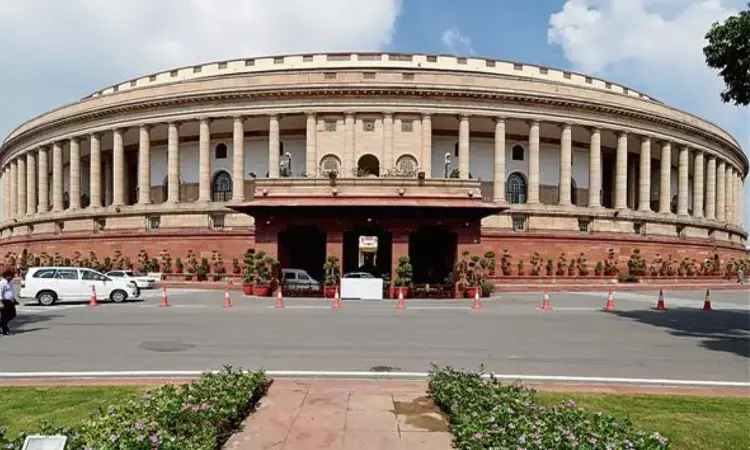- Home
- Medical news & Guidelines
- Anesthesiology
- Cardiology and CTVS
- Critical Care
- Dentistry
- Dermatology
- Diabetes and Endocrinology
- ENT
- Gastroenterology
- Medicine
- Nephrology
- Neurology
- Obstretics-Gynaecology
- Oncology
- Ophthalmology
- Orthopaedics
- Pediatrics-Neonatology
- Psychiatry
- Pulmonology
- Radiology
- Surgery
- Urology
- Laboratory Medicine
- Diet
- Nursing
- Paramedical
- Physiotherapy
- Health news
- Fact Check
- Bone Health Fact Check
- Brain Health Fact Check
- Cancer Related Fact Check
- Child Care Fact Check
- Dental and oral health fact check
- Diabetes and metabolic health fact check
- Diet and Nutrition Fact Check
- Eye and ENT Care Fact Check
- Fitness fact check
- Gut health fact check
- Heart health fact check
- Kidney health fact check
- Medical education fact check
- Men's health fact check
- Respiratory fact check
- Skin and hair care fact check
- Vaccine and Immunization fact check
- Women's health fact check
- AYUSH
- State News
- Andaman and Nicobar Islands
- Andhra Pradesh
- Arunachal Pradesh
- Assam
- Bihar
- Chandigarh
- Chattisgarh
- Dadra and Nagar Haveli
- Daman and Diu
- Delhi
- Goa
- Gujarat
- Haryana
- Himachal Pradesh
- Jammu & Kashmir
- Jharkhand
- Karnataka
- Kerala
- Ladakh
- Lakshadweep
- Madhya Pradesh
- Maharashtra
- Manipur
- Meghalaya
- Mizoram
- Nagaland
- Odisha
- Puducherry
- Punjab
- Rajasthan
- Sikkim
- Tamil Nadu
- Telangana
- Tripura
- Uttar Pradesh
- Uttrakhand
- West Bengal
- Medical Education
- Industry
States Responsible for Hospital Pricing amid patient cost fears: Health Ministry

Rajya Sabha
New Delhi: The Union Ministry of Health and Family Welfare has acknowledged that while patients in India often fear the cost of medical treatment more than the illness itself. However, the Ministry clarified that decisions regarding fixed-rate pricing models and advance cost disclosures in hospitals remain under the purview of individual States and Union Territories, as ‘health’ is a State subject.
To bring uniformity and accountability in healthcare services, the Government of India enacted the Clinical Establishments (Registration and Regulation) Act, 2010 (CE Act). The Act, along with the Clinical Establishments (Central Government) Rules, 2012, provides a regulatory framework for both government hospitals (excluding those operated by the Armed Forces) and private hospitals operating under recognised systems of medicine.
The government also offers comprehensive coverage through the Ayushman Bharat-Pradhan Mantri Jan Arogya Yojana (AB-PMJAY). This scheme includes expenses like pre-hospitalization (up to 3 days), diagnostics, medicines, consultations, and post-hospitalization care (up to 15 days).
To improve healthcare access in rural and underserved areas, the eSanjeevani telemedicine platform has been launched, offering remote consultations through two models: eSanjeevani AB-AAM and eSanjeevani OPD. In Maharashtra alone, over one crore consultations have been provided through this service.
Also Read: IMA Haryana warns 600 private hospitals to exit Ayushman Bharat over pending dues
He asked if so, why public hospitals have not adopted fixed-rate and transparent pricing models;
He also asked whether the Government plans to mandate public and private hospitals to give advance cost estimates for surgeries and major procedures.
He sought to know the steps being taken to ensure affordable, technology-driven healthcare in rural and underserved urban areas of Maharashtra; and
Furthermore, he inquired whether AI, real-time analytics, and cloud-based platforms are being integrated in Government hospitals to reduce costs and improve efficiency.
Also Read: Wait-time for planned surgeries at AIIMS Delhi extend up to 2 years, says Centre
Responding to the queries, the Minister of State for Health and Family Welfare, Smt. Anupriya Patel stated, ‘Health’ being a State subject, the primary responsibility to adopt fixed rate, transparent pricing models, to mandate hospitals to give advance cost estimates for surgeries and major procedures, along with ensuring affordable and technology-driven healthcare lies with States/UTs.
Nevertheless, the Government of India has enacted The Clinical Establishments (Registration and Regulation) Act, 2010 (CE Act) and notified Clinical Establishments (Central Government) Rules, 2012 thereunder to provide for registration and regulation of Government (except those of Armed Forces) as well as private hospitals belonging to recognized systems of medicine. Under the CE Act, for registration and continuation, every hospital is, inter alia, required to display the rates charged for each type of service provided and facilities available in the local as well as in English language at a conspicuous place for the benefit of the patients.
Health benefit packages under AB-PMJAY cover all associated costs, which may include pre-hospitalization expenses for up to 3 days, diagnostics, pre-medication, consultations as well as post-hospitalization expenses for up to 15 days.
Further, the Government of India has launched eSanjeevani – India’s national telemedicine service to ensure affordable, technology-driven healthcare in rural and underserved urban areas, which is implemented in two variants, viz., eSanjeevani AB-AAM (Ayushman Bharat Ayushman Arogya Mandir) and eSanjeevani OPD. In Maharashtra, eSanjeevani has served over one crore consultations. Further, NIC has developedthe NextGen e-Hospital system aimed at streamlining hospital operations, enhancing patient care and efficient use of public health resources, further added the minister.


